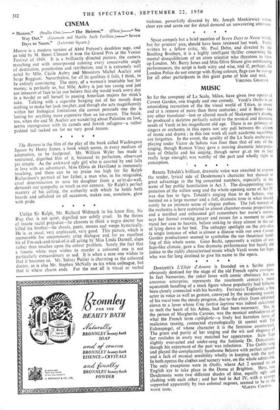MUSIC So far the company of La Scala, Milan, have
given two operas at Covent Garden, one tragedy and one comedy. Verdi's Otello is an astonishing recreation of the the .visual world of Titian, in music and at a remove of more than three centuries ; and it Boito—like any other translator-I—lost or altered much of Shakespeare's drama, he produced a skeleton perfectly suited to the musical and dramatic needs of Verdi in his magnificent old age. There is no primacy of singers or orchestra in this opera nor any pull between the claims of music and drama ; in this one work all such academic sqoabbles are forgotten. In the event, the quality of the La Scala orchestra's playing under Victor de Sabata was finer than that of any of the singing, though Ramon Vinay gave a moving dramatic interpreta- tion of Othello and his singing, though never gr_at (or in fact really large enough), was worthy of the part and wholly right in conception.
Renata Tebaldi's brilliant, dramatic voice was unsuited to express the tender, lyrical side of Desdemona's character but showed to great advantage in the big concerted numbers, especially in the scene of her public humiliation in Act 3. The disappointing inter- pretation of the willow song and the whole opening scene-of Act IV was due less to Sgra. Tebaldi's singing than to de Sabata, who insisted on a large manner and a full, dramatic tone in what should surely be an intimate scene of elegiac pathos. The full_ torrent of the orchestra is here restricted to almost chamber-music proportions, and a terrified and exhausted girl remembers her nurse's stories, says her formal evening prayer and rouses for a moment to com- mend her case to heaven, before sinking to sleep almost in the act of lying down in her bed. The unhappy spotlight on the prie-dieu (a single instance of what is almost a disease with our own Covent Garden productions) seemed to symbolise the too theatrical hand- ling of this whole scene. Gino Bechi, apparently a victim of our lago-like climate, gave a fine dramatic performance but hardly did justice to the richly characterised music which Verdi wrote for lago, who was for long destined to give his name to the opera.
Donizetti's L'Elisir • d'Amore is founded on a Scribe piece obviously destined for the stage of the old French opera comique. In fact Nemorino, the yokel lover with comic obstinacy but no amorous enterprise, represents the nineteenth century's more squeamish handling of a stock figure whose popularity had hitherto been closely connected with his bawdry. Ferruccia Tagliavini, a fine actor in voice as well as gesture, conveyed by the increasing suavity of his vocal tone the steady. progress, due to the elixir, from inhibited clown to a lover whose Una furtiva lagrima was indeed calculated to melt the heart of his Adina, had that been necessary. She, in the person laf Margherita Carosio, was the musical embodiment of what the French term espieglerie—a lively but harmless form of malicious teasing, connected etymologically (it seems) with Tyl Eulenspiegel, of whose character it is the feminine counterpart. The grace and purity of her singing and the wit and elegance of her roulades in every way matched her appearance. Italo Tajo slightly over-acted and under-sang the fantastic Dr. Dulcamara, though his enjoyment of the part was infectious. Tito Gobbi sang and played the complacently handsome Belcore with perfect aplomb and a lack of musical sensibility wholly in keeping with the part. In both operas the clothes and scenery were, on the whole admirable. The only exceptions were in Otello, where Act .2 seemed to an English eye to take place in the _Dome at Brighton. Here, too. Desdemona wore two different shades of blue, equally ugly and clashing with each other ; and her bed in Act IV., with a canoe' supported apparently by two colossal negroes, seemed to be in the






































 Previous page
Previous page